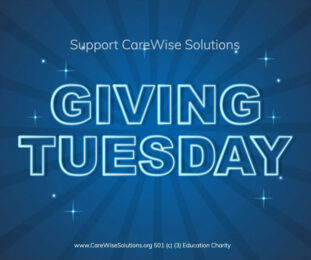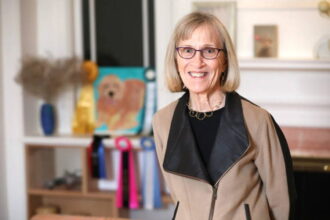Eldercaring Coordination Helps Put an End to Caregiving Legal Battles

AARP – Updated for November 2021
Author: Amanda Singleton
This dispute resolution process can reduce conflict and improve communication
When family members disagree about how best to help an aging loved one, issues can get so heated that the parties take the fight to court. Drawn-out, highly disputed court cases are stressful, expensive and time consuming. The strain already felt by family caregivers becomes overwhelming when they are wrapped up in litigation while simultaneously caring for their loved one.
As an attorney, I see conflicts in caregivers’ lives every day: A sibling feels they’re being kept in the dark about Dad’s health; someone suspects that the caregiver is spending Mom’s money on themselves; or the out-of-state relatives believe (sight unseen) that the caregiver is neglecting their care partner. Tensions boil over and they seek my advice about their legal options. Most people aren’t litigious or sue-happy. They want to avoid going to court more than they want to go.
On the flip side, there are those who want to win at all costs. They’re seeking out a lawyer who will “go after” whoever has made them upset. They want a “shark” or a “bulldog” and they definitely don’t want to hear that they may not have a good legal argument or how much it will cost to pursue their target. They want to do battle and want the court to be their battlefield.
Those people can get so wrapped up in the discord that they forget that at the heart of it all is a person. And regardless of advancing years or state of mental capacity, that care recipient deserves participation in their life and autonomy and independence as much as possible. Their physical or mental health decline should not be used as an opportunity for family members to air grievances or go on a power trip. But that does unfortunately happen; their loved ones forget that caregiving is not about winning, it’s about fulfilling a person’s needs. And the reality of duking it out in court is that while the legal system may decide that one party prevails, there are no winners at the end of that day.
A dispute resolution process
A developing type of legal process aims to the heart of the conflict and may best serve our aging population. Eldercaring coordination is an alternative dispute resolution (ADR) process that brings together the older adult, their legally authorized decision makers (like those named in a power of attorney or their legal guardian), and others (like family members) to resolve their arguments.
Eldercaring coordination services already are available in California, Florida, Idaho, Maryland, Minnesota and Ohio. These services are modeled on parenting coordination (which is used in divorce and custody cases involving children). Much like parenting conflicts, eldercare conflicts bring out the worst in people. The eldercaring coordination process seeks to calm the fight and re-center the parties’ focus on what is most important — having a plan for the safety and well-being of a vulnerable person.
In my home state of Florida, the courts have been running an eldercaring coordination pilot program for several years. In 2021, Florida became the first state to enact a law that recognizes eldercaring coordination as a new form of ADR in cases involving adults over the age of 60.
Eldercaring coordination recognizes that other types of ADRs — like collaborative processes or mediation— sometimes just aren’t effective. Mediation is all about compromise, and in highly contentious cases, the parties may not be willing to budge. Some even use mediation as an opportunity to vent and just make things worse. Eldercaring coordination is a court-ordered process. It often comes into play when aggrieved parties cannot settle a dispute. There are several ways it can be initiated: Both parties can agree to it; one party can ask for it; or the judge or magistrate can independently refer the case to eldercaring coordination. The process also recognizes that years of ongoing litigation rarely serve anybody’s best interests. With that in mind, the court can refer a case to eldercaring coordination when it sees circumstances like:
- Concerns about an older adult’s safety or well-being
- Disputes about issues that are frequent, unsubstantiated or raising nonlegal issues to the court
- Possessive or controlling behavior
- Contested guardianships or conservatorships
- Unfair/unbalanced power among the parties (like some have lawyers and some don’t)
Creating an action plan for families
Eldercaring coordinators are specialized, impartial professionals who qualify through their educational, employment and personal backgrounds, and through training in a variety of topics, including multicultural competency, elder abuse and family dynamics.
The eldercare coordinator is authorized to:
- Facilitate communication and negotiation and help the parties develop problem-solving skills
- Provide education about eldercare resources
- Create, modify or implement an eldercaring plan (and reassess it as necessary to keep the older adult safe, resolve ongoing disputes, and meet the elder’s changing needs)
- Make recommendations for resolving disputes about the care and safety of the older adult
- Make decisions authorized by the court in the scope of its referral order
An eldercare coordinator’s services will help family caregivers with the juggling act of caregiving and help their families to understand the multifaceted nature of care. The coordination doesn’t fully replace the other services that caregivers and older adults may need. Florida’s new law says that it is intended to complement and enhance services in other areas, “such as the provision of legal information or legal representation; financial advice; individual or family therapy; medical, psychological, or psychiatric evaluation; or mediation, specifically for issues related to the care and needs of elders.” So caregivers, care partners and their families will have an opportunity for a fully holistic plan of action utilizing a variety of resources in conjunction with the eldercaring coordination.





